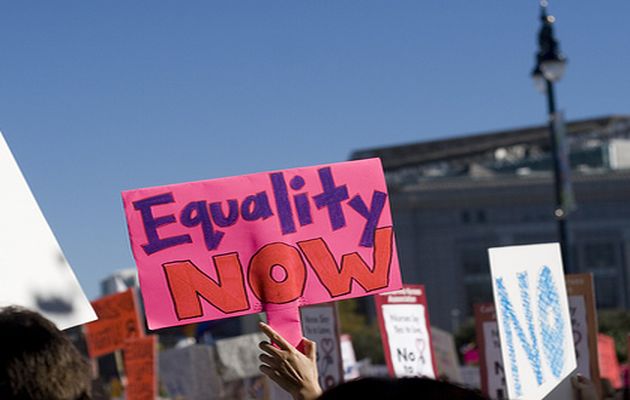Institutions and gender NGOs urge for measures to ensure women’s equal access to and full participation in power structures and decision-making.
 Pro women equality demostration
Pro women equality demostration
The EU made equality between women and men one of its founding values in 1957. Since then anti-discrimination legislation has been adopted and subsequent strategies have been fleshed out.
Women across the world earn 77% of the amount paid to men. This figure has improved by only three percentage points in the past 20 years, according to a report from the UN’s International Labour Organisation (ILO).
GENDER PAY GAP
The gender gap in work has barely shifted since the Beijing Declaration on women’s rights, signed by 189 governments in 1995: today 50% of the world’s women work, compared with 77% of men. In 1996, the figures were 52% and 80% respectively.
In addition to the gender pay gap of 16% on average, women continue to work more unpaid hours than men at home. Women are also still overrepresented in lower paid sectors in the labour market, and under-represented in decision-making positions.
"Austerity has made it worse, but it is part of a systemic problem that discriminates against women and creates a Pink Ghetto which is hard for women to escape”, said Joanna Maycock, European Women’s Lobby Secretary-General.
Over and above the pay gap, women face a “motherhood pay gap”. Women with children can expect to earn less when they return to work than childless women, with the difference increasing for every child they have, according to the ILO.
 Women with children can expect to earn less when they return to work / Corbis
Women with children can expect to earn less when they return to work / Corbis
Italy, Europe’s fourth largest economy, has a bigger gender gap than Nicaragua, Mozambique and Botswana, while Nordic countries are the best places for women to work. Iceland, for the sixth year running, topped the global chart, followed by Finland, Norway, Sweden and Denmark
WOMEN ON BOARDS
Since October 2010, the share of women on boards has risen by 7.6%. But that is not enough. The Commission is expected to draft a new strategy reviewing priorities of the current gender equality strategy and evaluating progress made, and the European Parliament is drafting its own-initiative report on the same topic too.
Vera Jourová, European commissioner for justice, consumers and gender equality, has emphasized the importance of equality: “Gender equality at all levels of society is crucial for Europe’s economic recovery “, and last December, she proposed a directive that would set a minimum objective of 40 per cent of the under-represented sex in non-executive board positions in listed companies in Europe by 2020.
Besides, a third of all women are “victims of physical and/or sexual violence that affects their attendance at work”. The latest figures from the World Bank showed that 700m women are victims of either physical or sexual violence – in the Middle East and Africa, 40% are victims, in south East Asia the figure is 43%.
 Since October 2010, the share of women on boards has risen by 7.6%. But that is not enough / Corbis
Since October 2010, the share of women on boards has risen by 7.6%. But that is not enough / Corbis
INTERNATIONAL MONETARY FUND REPORT
The International Monetary Fund, also published a report last week, called Fair Play: More Equal Laws Boost Female Labour Force Participation. The study found that restrictions on women’s rights, as well as legal impediments to undertaking economic activities, are strongly associated with gender gaps in labour force participation, which can negatively impact a country’s Gross Domestic Product.
Christine Lagarde, Managing Director of the International Monetary Fund, has stated that ” equality in the workplace actually makes economic sense, can spark more growth, as well as bring about a more diverse society that can be much more profitable from the global economic point of view.”
EVANGELICAL WOMEN
On the eve of International Women’s Day on Sunday (8 March), Protestante Digital has asked several Spanish evangelical churches and organizations about gender equality, and it came to the conclusion that any of them prevent women for accessing to managerial position, although, when that position is related to the pastoral ministry, there might be some obstacles.
“It is a fact that the presence of women in church’s ministry is growing. More women are now going to seminaries, and that education is giving them more opportunities to serve in the ministry; but we should admit that, at the end, for one reason or another, the majority of the managerial positions are occupied by men”, said Mariano Blazquez, president of the Federation of Evangelical Religious Entities in Spain.
Jaume Llenas, Spanish Evangelical Alliance’s General Secretary, emphasized the importance of having “a serious reflection about this among evangelical churches”, because “if in the past, we went with the world flow, preventing women for accessing to positions allowed for them, now, it is also possible that we end up going with another secular flow that can lead us to opposite conclusions”.

Las opiniones vertidas por nuestros colaboradores se realizan a nivel personal, pudiendo coincidir o no con la postura de la dirección de Protestante Digital.
Si quieres comentar o